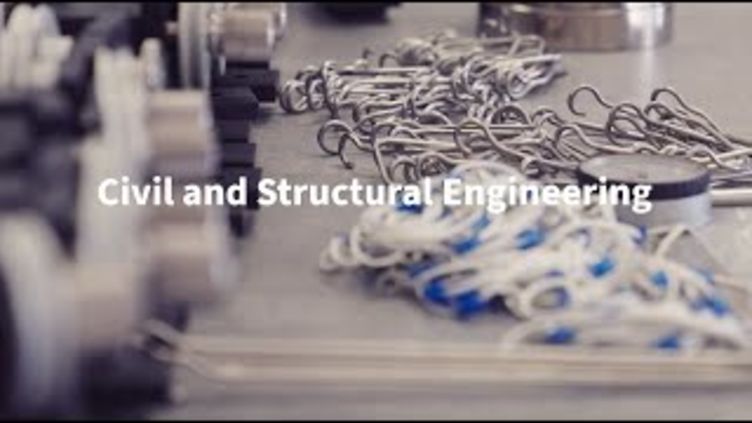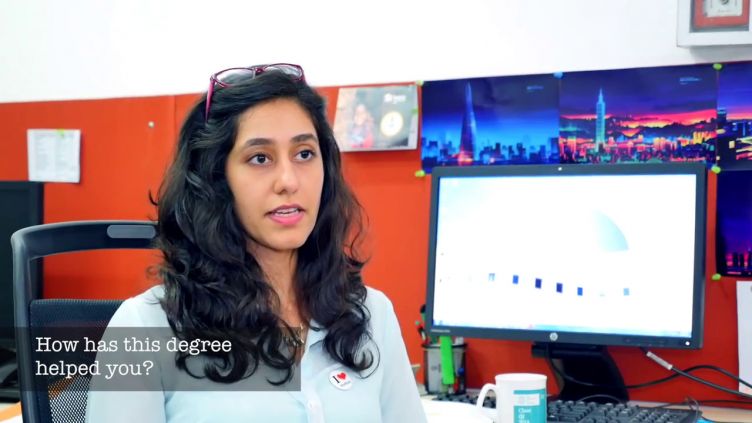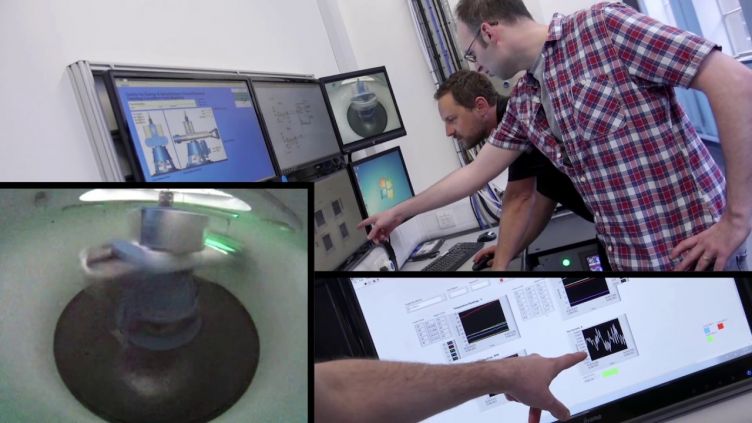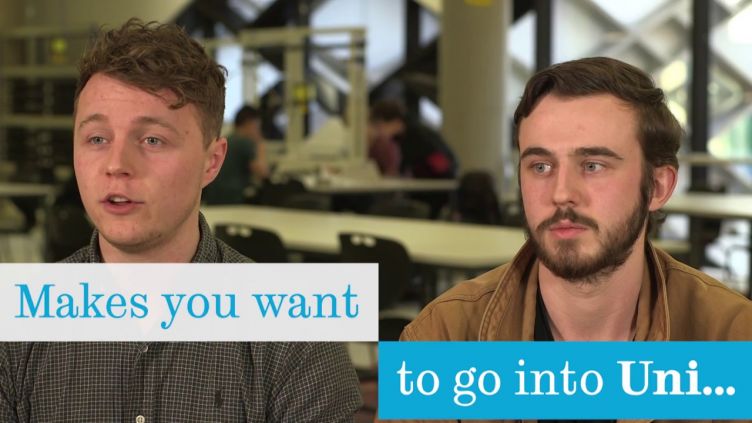Civil Engineering BEng
2025-26 entryIf you're not sure which area of civil engineering you want to go into, this broad-based course is a good choice. The first and second years introduce the core disciplines of structures, water, geotechnics and environmental issues. In the third year, you'll work as part of a team working on a realistic engineering design project.
Key details
- A Levels AAA
Other entry requirements - UCAS code H202
- 3 years / Full-time
- September start
- Accredited
- Find out the course fee
- Optional placement year
- Study abroad
Explore this course:
Course description
Why study this course?
By studying at BEng level, you have the option to graduate, continue your education with an MSc, or (subject to performance) change to an MEng programme after year two.
Our series of design projects, culminating in the final semester integrated design project, allows you to integrate technical knowledge with more practical design considerations. You can develop capability in tackling realistic projects and address the complex challenges in engineering a low carbon future.
You will be taught by specialist researchers and a team of teaching specialists with a wealth of industry experience who support design-based learning.
'Learning by doing' is the reason The Diamond was built. Dedicated to engineering, this is where you’ll apply the theory you learn in lectures – consolidating your understanding alongside students from other disciplines, and beyond the bounds of the curriculum.
Supported by a team of staff with industry experience, our programmes empower and support you to take responsibility for your own development and develop skills and attributes that prepare you for a future as a professional civil or structural engineer.
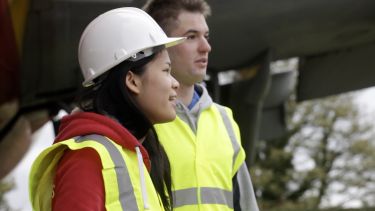
With an ethos of sustainability guiding every decision, this course emphasises both strong technical skills, and the importance of engineering for the good of society.
Taught by research-active academics and teachers with extensive industrial experience, the Civil Engineering BEng at Sheffield is the right choice if you’re passionate about the subject, but not sure which direction your career will take.
The course integrates a strong focus on civil engineering analysis and design with the latest research on sustainable development – equipping you to tackle challenges in the built environment and design innovative solutions that minimise impact on the environment.
In the first two years, you will study the core subjects needed to be a successful civil engineer: structural engineering, materials, fluid mechanics, and geotechnics.
Group projects will see you take on complex real-world problems – applying your engineering knowledge, while developing the transferable skills like communication, team working and project management, sought after by employers.
You’ll have plenty of opportunities to apply your theoretical knowledge in project work – taking on civil engineering challenges, including climate-resilient infrastructure.
During your final year, you’ll explore aspects of sustainable building and infrastructure design. In the final semester, this all comes together in your individual project – and in your integrated design project where you’ll work as part of a team to devise concepts for a sustainable urban regeneration project.
By the time you graduate, you will have developed important skills and attributes so that you are well prepared for the next stage in your career.
This degree is accredited by the Joint Board of Moderators (JBM) comprising the Institution of Civil Engineers, Institution of Structural Engineers, Institute of Highway Engineers, the Chartered Institution of Highways and Transportation and the Permanent Way Institution on behalf of the Engineering Council for the purposes of partially meeting the academic requirement for registration as a Chartered Engineer (CEng). Candidates must hold a masters or doctorate accredited as further learning for CEng to hold accredited qualifications for CEng registration. See the JBM website for further information and details of Further Learning programmes for CEng:
Modules
A selection of modules are available each year - some examples are below. There may be changes before you start your course. From May of the year of entry, formal programme regulations will be available in our Programme Regulations Finder.
Choose a year to see modules for a level of study:
UCAS code: H202
Years: 2022, 2023
Core modules:
- Practical Application of Civil and Structural Engineering
-
Civil and Structural Engineering programmes provide their students with the knowledge and skills to shape the world. However, with this power, also comes huge responsibility. This module focuses on developing the attitudes and behaviours that engineers require to apply their new-found knowledge appropriately in the context of the 21st century.
20 credits
The module will draw very heavily on a broad range of interactive projects and workshops, providing the context on which their other academic modules are founded.
Short practical exercises will be used as the framework to introduce reflective practice, developing students' ability to solve engineering problems, and to also take ownership of their own educational development. Small groups projects will also provide a lens for students to start developing an awareness of the complex human relationships at the heart of any engineering project.
Through lectures and workshops students will be introduced to the historical context of their profession, and will debate the evolving ethical challenges facing modern civil and structural engineers.History will be used as the lens to explore: the moral basis for civil and structural engineering; the link between they physical world and evolving theoretical models; and engineers' relationship to risk.
The module will next explore the relationship between physical structures and the various theoretical mental models that engineers can use to describe and analyse them. Practical make-and-break exercises will explicitly expose the power, and limitations, of our theoretical methods, whilst site-visits will allow students to internalise the impact and scale of their design decisions.
The module will introduce students to the concept of systems thinking, initially in its broadest sense, and then considering infrastructure as part of complex environmental and societal systems. Students will then be introduced to the concept of risk, and understand how risk management underpins all engineering decision making.
Working in small-groups the students will conduct a project to develop a solution to a real-world civil or structural engineering challenge, consolidating their learning from this module, and providing practical application for their wider programme learning outcomes.
The module assessment will consist of mandatory non-graded activities, and graded work. - Civil and Structural Engineering Mechanics
-
This module is delivered in both the Autumn and Spring Semesters. Teaching in the first semester is designed to provide a basis of knowledge and understanding of elastic structural analysis and will be applied to two key structural forms - trusses and beams. The focus of the second semester is on the analysis of stress, strain and elastic deformation of beams.
20 credits - Engineering Surveying
-
In this module you will learn basic engineering surveying skills and the role spatial data plays in civil engineering design and construction. You will gain hands-on experience in using different types of surveying equipment and in basic manipulation of spatial data. You'll gain key transferable skills in metrology and checking data accuracy.
10 credits - Hydraulic Principles and Flow in Pipes
-
This module aims to build a common understanding of the principles of fluid mechanics, progressing from statics such as pressure and force on objects, through properties and laws of hydro-dynamics including continuity, energy and momentum principles of fluid in motion, leading to the ability to understand and analyse fluid flows in pipes including simple networks and the operation of pumps. Overall, you will gain the essential understanding of fluid mechanics and application to pipe flows. This will be achieved through a series of lectures, building to practical real world examples, laboratory classes and tutorial sheets. Theory is reinforced through practical experimentation and problem solving.
20 credits - Soil Mechanics
-
This module is an introductory module to the use of soils in engineering practice. As soils are a naturally varying material, the creation of different soil types is first discussed giving the student a background in why soils differ. This then progresses into the engineering classification of soils followed by the design of simple geotechnical structures. These include retaining walls and earth embankments.
10 credits - Introduction to Structural Materials Engineering
-
This lecture course focusses on materials for structural applications and covers all the main classes of materials (ceramics, metals, polymers, natural materials and composites), describing the properties that they show, the root cause of their properties, the structure, and how we can affect this by processing to get the properties we want. The course will also introduce some ways that the best material for a purpose can be selected.
10 credits - Mathematics and Python Programming
-
This module aims to reinforce and extend students' previous knowledge of mathematics studied before university, and introduces the use of computer programming to solve engineering and mathematical problems.
20 credits
Mathematics is further taught to develop new basic mathematical techniques needed to support the engineering subjects taken at levels 1 and 2. It also provides a foundation for the level 2 mathematics courses in the department. Combined with the mathematics teaching, this module teaches the opensource programming language, Python, which can be used to efficiently solve a variety of practical scientific and numerical problems.
A combination of formal lecture content, tutorials and assisted computer lab sessions, help the students learn and apply mathematical and programming theory. Practice problems are presented showing the links between mathematics and programming learning, to show how the skills learnt can solve practical problems of relevance to the students. - Global Engineering Challenge Week
-
The Faculty-wide Global Engineering Challenge Week is a compulsory part of the first-year programme. The project has been designed to develop student academic, transferable and employability skills as well as widen their horizons as global citizens. Working in multi-disciplinary groups of 5-6, for a full week, all students in the Faculty choose from a number of projects arranged under a range of themes including Water, Waste Management, Energy and Digital with scenarios set in an overseas location facing economic challenge. Some projects are based on the Engineers Without Borders Engineering for people design challenge*.
*The EWB challenge provides students with the opportunity to learn about design, teamwork and communication through real, inspiring, sustainable and cross-cultural development projects identified by EWB with its community-based partner organisations. - Sustainable Design and Engineering Skills
-
This module is designed to ensure students have the skills to design solutions and assess options against sustainability criteria to make evidence based recommendations. Students will be able to look at the bigger picture of a projects impact on our complex systems and society.
10 credits
Core modules:
- Geotechnical Engineering 2
-
This module is aimed at extending your knowledge of soil mechanics and geotechnical engineering. The focus is on applying fundamental understanding of mechanics to geotechnical problem solving with an emphasis on fluid-soil and structure-soil interaction. The approach is designed to link soil mechanics theory (e.g. seepage, consolidation, bearing capacity, settlement) to practical application (e.g. deformation and failure of foundations and slopes) through the use of physical models, numerical models and case studies. The course will encompass lectures, tutorials, group work including laboratories, and directed and independent reading.
20 credits - Pipes and Open Channel Hydraulics
-
This module will equip students with the understanding and abilities to analyse flow in pipes and open channels. This will be achieved through a series of lectures, laboratory classes and tutorial sheets. Theory is reinforced through practical experimentation and problem solving. A particular feature of the module is the development of student driven, enquiry based learning through increasingly flexible and self-driven small group laboratory and e-learning resources.
20 credits - Structural Analysis
-
This module is designed to improve your knowledge understanding of how elastic and plastic methods of structural analysis can be applied to various structural forms. The module will be delivered via lectures, supported by problem-solving, and computer and laboratory classes. You will develop your ability to analyse structures under working and ultimate loads, by hand and via computer.
20 credits - Structural Engineering Design and Appraisal
-
This module will discuss the fundamental principles of structural engineering philosophy and design. The theories and concepts of analysis and design of structural elements will be presented for the most commonly used structural materials and discussed along with the more prescriptive design rules included in the relevant Eurocodes.
20 credits - Construction Project Management
-
This module is designed to introduce students to key factors that influence the development and management of construction projects throughout their lifecycle and various key construction management processes/ techniques / tools that can be used to plan, co-ordinate and control project development. It will also introduce professional and legal responsibilities of industry practitioners. The module will involve research, evaluation and discussion of industry information on issues such as construction project procurement, project planning, health and safety risk management, project risks and technological developments in the construction industry. The module will be assessed through group presentations and an individual reflective report.
10 credits - Further Civil Engineering Mathematics and Computing
-
This module is part of a series of second-level modules designed for the particular group of engineers shown in brackets in the module title. Each module consolidates previous mathematical knowledge and new mathematical techniques relevant to the particular engineering discipline.
10 credits - Materials for Structural Engineering
-
This module looks at the role of materials and materials properties used for structural design. The module will be delivered using a combination of lectures, on-line learning initiatives and group-based practicals.
10 credits
The module aims to introduce you to a variety of materials used for structural applications. You will be exposed to materials selection, mechanics and physical principles responsible for specific materials being utilised to meet specific design requirements. A range of test methods for materials properties will be discussed, as well as, non-destructive methods used for assessing quality and the extent of defects in materials. - Water and Wastewater
-
This module gives students an introduction into water management and in particular the treatment of water for drinking and the treatment of wastewater. The module will consider water resource issues and examine and learn about the range of technologies use to treat raw water, before domestic use, and wastewater, after domestic use.
10 credits - Engineering - You're Hired
-
The Faculty-wide Engineering - You're Hired Week is a compulsory part of the second year programme, and the week has been designed to develop student academic, transferable and employability skills. Working in multi-disciplinary groups of about six, students will work in interdisciplinary teams on a real world problem over an intensive week-long project. The projects are based on problems provided by industrial partners, and students will come up with ideas to solve them and proposals for a project to develop these ideas further.
- Individual Project
-
CIV3202 has 6 weeks of the spring semester allocated, and is specifically for BEng students. Students are allocated their dissertation topic and supervisor early in the autumn semester, and are encouraged to start working on the project (e.g. carrying out their literature review and refining the topic to be researched, as appropriate) as early as possible. This module is intended to enable participants to extend their knowledge and develop skills in investigation. In order to complete this module successfully, students will also need to develop ability to plan and manage their own progress. In addition, this module has been designed to help develop student's ability to communicate their work, in written and oral forms. Each student will be allocated an academic supervisor for this module. Students are expected to arrange meetings with their supervisor at regular intervals, for which they should produce agendas and meeting minutes.
30 credits - Integrated Design Project - Concept Design Stage
-
The Integrated Design Project - Concept Design Stage is a series of linked modules running for 14 weeks of the spring semester. The aim of these modules is to give you the opportunity to experience the engineering design process by working on proposals for redevelopment of a real brownfield site located in Sheffield.
20 credits
At the start of this 5 week long module, known as Integrated Design Project - Concept Design Stage Part 1, you will take part in a master-plannning exercise, giving you the opportunity to develop various skills whilst working collaboratively with students from the University's School of Architecture.
You will build on the above master-plannning exercise in subsequent parts of the module/project, which involve engineering development of a scheme considering stakeholder requirements, through option identification and evaluation, to the production of design calculations and drawings. Accordingly, you will consider the overall concept/scheme design, where ability to consider and integrate a wide range of issues is more important than detailed design calculations. - Advanced Structural Analysis
-
Advanced Structural Analysis aims to teach you the most modern theories suitable for performing the static assessment of structural members subjected to in-service multiaxial loading. Initially, this module focuses on the linear-elastic behaviour of structural members loaded in torsion as well as in bending. The fundamental equations modelling the behaviour of beams under the above loading conditions are derived by following rigorous mathematical procedures. The module examines also those equivalent stresses (such as von Mises, Tresca, etc.) commonly used in situation of practical interest do design structural members against complex systems of forces and moments. Finally, the problem of designing notched structural members against multiaxial static loading is addressed in great detail by considering both ductile and brittle materials.
10 credits - Civil Engineering Research Skills
-
This module introduces academic engineering research and associated skills to students. It provides an academic training basis for the independent research project and provides a means to complete the proposal for this piece of work. It helps students understand various methodologies they are exposed to in their course of study, develop a data analysis capability and develop the skills of reading and critiquing the original academic literature in civil engineering and allied disciplines. Such skills are also essential for undertaking high calibre consultancy work when employed by industry.
10 credits - Accounting and Law for Engineers
-
The module is designed to introduce engineering students to key areas of accounting and legal risk that engineers should be aware of in their working environment. The module will draw directly on practical issues of budgeting, assessing financial risks and making financial decisions in the context of engineering projects and/or product development. At the same time, the module will develop students' understanding of the legal aspects of entering into contracts for the development and delivery of engineering projects and products, and enhance their awareness of environmental regulation, liability for negligence, intellectual property rights and the importance of data protection. Through a series of parallel running lectures in the two disciplines, the module will provide a working knowledge of the two areas and how they impinge on engineering practice.
10 credits - Geotechnical Design
-
This module is designed to develop your understanding of the concepts behind geotechnical design and how safety and idealisations are built into design calculations to deal with the complexity of subsurface stratigraphy, groundwater, soil behaviour and modelling issues for both Ultimate Limit State (ULS) and Serviceability Limit State (SLS). Through lectures, tutorial sheets, software exercises, and a design project, you will develop your knowledge of design calculations for retaining structures, reinforced soil and foundations in the context of Eurocode 7. You will also develop your ability to use a range of state of the art engineering design concepts and tools.
10 credits - Integrated Design Project - International Report and Individual Portfolio
-
International/Global Context of Engineering' (5 credits)The CEO of your group has just been made aware of a project very similar to that in the CIV3201 module (Part 1 of the IDP) being planned in a specified location overseas (note that each group will be given a different location) and is considering submitting a tender for the design and construction works. If the tender is successful, it may lead to further opportunities for working on similar projects in the region.The CEO has therefore requested that you prepare a report, to be presented at the next board meeting, which discusses and critically evaluates the risks and opportunities of carrying out such projects. Your report will help the board to decide whether or not to submit a tender for the project.For this part of the project, you will work in the same groups as for Part 2 if you are a Y3 MEng student, or if a newly formed group if you are a BEng student. You will need to undertake research into conditions in the country specified, identifying the principal differences and similarities between working in the UK and overseas, thinking broadly about the conditions (environmental, political, cultural, social etc as well as technical issues) that could impact on the design or construction of the project. By evaluating the risks and opportunities, associated with these issues, you should be able to recommend what additional measures /considerations your company would have to take so they can make an informed and objective decision whether to tender.'Individual Reflection', ' Portfolio and Training Scheme Document' (5 credits). This part of the project should be carried out individually. The final stage in any project should be to review the process undertaken, identifying and evaluating successes (so they can be repeated) and failures (so improvements can be made), and noting requirements for further training and development. This process is also reflected in graduate training towards a professional qualification such as becoming a Chartered Engineer. This involves demonstrating achievement of levels of competence in a range of areas for development as a professional engineer, as well as planning your professional development.Therefore, at the end of this project, you should draw together reflections on your project and group work experience throughout the semester to develop a report and portfolio demonstrating your learning and achievements, relating this to achievement of at least 3 of the ICE member Attributes or IStructE Core Objectives or the Sheffield Graduate Award (SGA) scheme equivalent.
10 credits
Optional modules:
- Advanced Structural Design and Appraisal
-
This module takes students through the structural design process, based around a case study of a real building.
10 credits
The process initially looks at options for gravity load-bearing elements, (such as floor slabs, beams and columns) as well as options for lateral load resisting systems (such as reinforced concrete shear walls / cores and steel bracing frames), before carrying out analysis and design of the selected options.
The module also looks at key considerations such as fire, robustness and vibration.
This module is intended to prepare students for carrying out the analysis and design of structures in the 'Integrated Design Project' (IDP).
- Computational Engineering Mathematics
-
To provide the necessary mathematical framework to understand advanced computational methods for the solution of complex engineering problems. At the end of the course the student should: 1. understand and be able to derive the basic equations of continuum mechanics; 2. understand and be able to derive the basic equations of fluid mechanics; 3. have a basic understanding of how to use basic Finite Difference methods in the context of complex engineering problems.
10 credits - Urban Drainage Engineering
-
This module is designed to provide you with an understanding of the fundamental concepts and processes associated with hydrology and urban drainage design, and to apply these concepts to a variety of drainage engineering problems. Through lectures, tutorials and individual literature and case study research, you will develop your knowledge of current and developing practice in urban drainage, including the increasingly important roles of Sustainable Drainage Systems (SuDS).
10 credits
The content of our courses is reviewed annually to make sure it's up-to-date and relevant. Individual modules are occasionally updated or withdrawn. This is in response to discoveries through our world-leading research; funding changes; professional accreditation requirements; student or employer feedback; outcomes of reviews; and variations in staff or student numbers. In the event of any change we'll consult and inform students in good time and take reasonable steps to minimise disruption.
Learning and assessment
Learning
The following are the main learning and teaching methods implemented within the programme:
- lectures
- tutorials (and example classes)
- practical activities
- design classes
- coursework assignments (including oral, video and poster presentations)
- Individual Investigative Project (final year)
- integrative projects
- online resources
We've academic staff who are world-leaders in their respective fields and some have over 20 years' experience in industry. Our staff experience demonstrates how engineering fundamentals are applied in practice through project work that mimics real-life situations. We also bring in leading industry experts to enhance and support our teaching and advise on our curriculum.
Assessment
Students are assessed via a mix of the following:
- examinations
- coursework assignments
- online tests
- reports
- group projects
- presentations
- design work
- dissertations
Programme specification
This tells you the aims and learning outcomes of this course and how these will be achieved and assessed.
Entry requirements
With Access Sheffield, you could qualify for additional consideration or an alternative offer - find out if you're eligible.
The A Level entry requirements for this course are:
AAA
including Maths
- A Levels + a fourth Level 3 qualification
- AAB including A in Maths + A in a relevant EPQ; AAB including Maths + A in AS or B in A Level Further Maths
- International Baccalaureate
- 36 with 6 in Higher Level Maths
- BTEC Extended Diploma
- DDD in Engineering + A in A Level Maths
- BTEC Diploma
- DD in Engineering + A in A Level Maths
- Scottish Highers + 1 Advanced Higher
- AAAAB + A in Maths
- Welsh Baccalaureate + 2 A Levels
- A + AA including Maths
- Access to HE Diploma
- Award of Access to HE Diploma in a relevant subject, with 45 credits at Level 3, including 39 at Distinction (to include Maths and Science or Engineering units), and 6 at Merit + Grade A in A Level Maths
-
GCSE Physics (or Combined Science) grade 6/B
-
Acceptable Maths subjects include Maths, Maths with Mechanics, Further Maths or Applied Maths, but not Statistics or Use of Maths. Pure Maths is only acceptable when combined with Physics
The A Level entry requirements for this course are:
AAB
including Maths
- A Levels + a fourth Level 3 qualification
- AAB including A in Maths + A in a relevant EPQ; AAB including Maths + A in AS or B in A Level Further Maths
- International Baccalaureate
- 34 with 5 in Higher Level Maths
- BTEC Extended Diploma
- DDD in Engineering + B in A Level Maths
- BTEC Diploma
- DD in Engineering + B in A Level Maths
- Scottish Highers + 1 Advanced Higher
- AAABB + B in Maths
- Welsh Baccalaureate + 2 A Levels
- B + AA including Maths
- Access to HE Diploma
- Award of Access to HE Diploma in a relevant subject, with 45 credits at Level 3, including 36 at Distinction (to include Maths and Science or Engineering units), and 15 at Merit + Grade A in A Level Maths
-
GCSE Physics (or Combined Science) grade 6/B
-
Acceptable Maths subjects include Maths, Maths with Mechanics, Further Maths or Applied Maths, but not Statistics or Use of Maths. Pure Maths is only acceptable when combined with Physics
You must demonstrate that your English is good enough for you to successfully complete your course. For this course we require: GCSE English Language at grade 4/C; IELTS grade of 6.5 with a minimum of 6.0 in each component; or an alternative acceptable English language qualification
Equivalent English language qualifications
Visa and immigration requirements
Other qualifications | UK and EU/international
If you have any questions about entry requirements, please contact the school/department.
Graduate careers
School of Mechanical, Aerospace and Civil Engineering
Our graduates work all over the world, from the UK to Australia and the USA. Recent graduates have gone on to work for AECOM, Arup, Atkins, Buro Happold, Eastwood & Partners, and Kier.
You'll be able to apply your knowledge and skills to fields as diverse as the built environment, sustainability and improving the environment.
In addition, architectural engineering graduates might go into a broad range of engineering areas ranging from building services to mechanical, electrical or acoustic engineering.
Or as a structural engineer, you'll be helping to shape the world around us. Structural engineers design and construct multi-storey buildings, bridges, sports stadiums, tunnels, airports and schools.
School of Mechanical, Aerospace and Civil Engineering
National Student Survey 2024
The Times UK University Rankings 2024
Research Excellence Framework (REF2021)
Civil engineering is at the forefront of improving the way we live. Whether it's providing the facilities that keep our day-to-day lives running smoothly - from roads and railways to clean water supplies - or working to meet the ever-changing needs of our society in the areas of sustainability, renewable energy and climate change, you'll be helping to create and protect the world we live in.
Our courses will make you the kind of engineer the world needs right now; forward-thinking, interdisciplinary, environmentally conscious, and capable of the kind of complex thinking our rapidly changing society needs. Wherever you choose to start your career, you'll be in demand.
We're in the UK top ten for civil engineering, according to The Times UK University Rankings 2024. Our research is internationally recognised, with 96% of our research rated as world-leading or internationally excellent, according to the Research Excellence Framework 2021 (REF2021). Industry and government value our expertise.
Our industry partners contribute to teaching through lectures, design classes, projects and site visits. We work with leading consultants, contractors and specialist civil engineering companies to provide industrial opportunities for a number of students each year. We also have industrial tutors and professionals who mentor our first-year students.
You'll be taught in The Diamond, one of the best teaching spaces in the UK.
Facilities
The Diamond is home to dedicated laboratories and facilities such as our structures and dynamics lab, fluids engineering lab, and our thermodynamics and mechanics lab. This means you'll directly apply what you’ve learnt in lectures to lab sessions helping you to put theory into practice. Alongside teaching and study spaces, the Diamond is also home to iForge – the UK's first student-led makerspace.
School of Mechanical, Aerospace and Civil EngineeringUniversity rankings
Number one in the Russell Group
National Student Survey 2024 (based on aggregate responses)
92 per cent of our research is rated as world-leading or internationally excellent
Research Excellence Framework 2021
University of the Year and best for Student Life
Whatuni Student Choice Awards 2024
Number one Students' Union in the UK
Whatuni Student Choice Awards 2024, 2023, 2022, 2020, 2019, 2018, 2017
Number one for Students' Union
StudentCrowd 2024 University Awards
A top 20 university targeted by employers
The Graduate Market in 2023, High Fliers report
A top-100 university: 12th in the UK and 98th in the world
Times Higher Education World University Rankings 2025
Student profiles
Fees and funding
Fees
Additional costs
The annual fee for your course includes a number of items in addition to your tuition. If an item or activity is classed as a compulsory element for your course, it will normally be included in your tuition fee. There are also other costs which you may need to consider.
Funding your study
Depending on your circumstances, you may qualify for a bursary, scholarship or loan to help fund your study and enhance your learning experience.
Use our Student Funding Calculator to work out what you’re eligible for.
Placements and study abroad
Placement
Study abroad
Visit
University open days
We host five open days each year, usually in June, July, September, October and November. You can talk to staff and students, tour the campus and see inside the accommodation.
Subject tasters
If you’re considering your post-16 options, our interactive subject tasters are for you. There are a wide range of subjects to choose from and you can attend sessions online or on campus.
Offer holder days
If you've received an offer to study with us, we'll invite you to one of our offer holder days, which take place between February and April. These open days have a strong department focus and give you the chance to really explore student life here, even if you've visited us before.
Campus tours
Our weekly guided tours show you what Sheffield has to offer - both on campus and beyond. You can extend your visit with tours of our city, accommodation or sport facilities.
Apply
Contact us
- Telephone
- +44 114 222 5738
- study@sheffield.ac.uk
The awarding body for this course is the University of Sheffield.
Recognition of professional qualifications: from 1 January 2021, in order to have any UK professional qualifications recognised for work in an EU country across a number of regulated and other professions you need to apply to the host country for recognition. Read information from the UK government and the EU Regulated Professions Database.
Any supervisors and research areas listed are indicative and may change before the start of the course.

